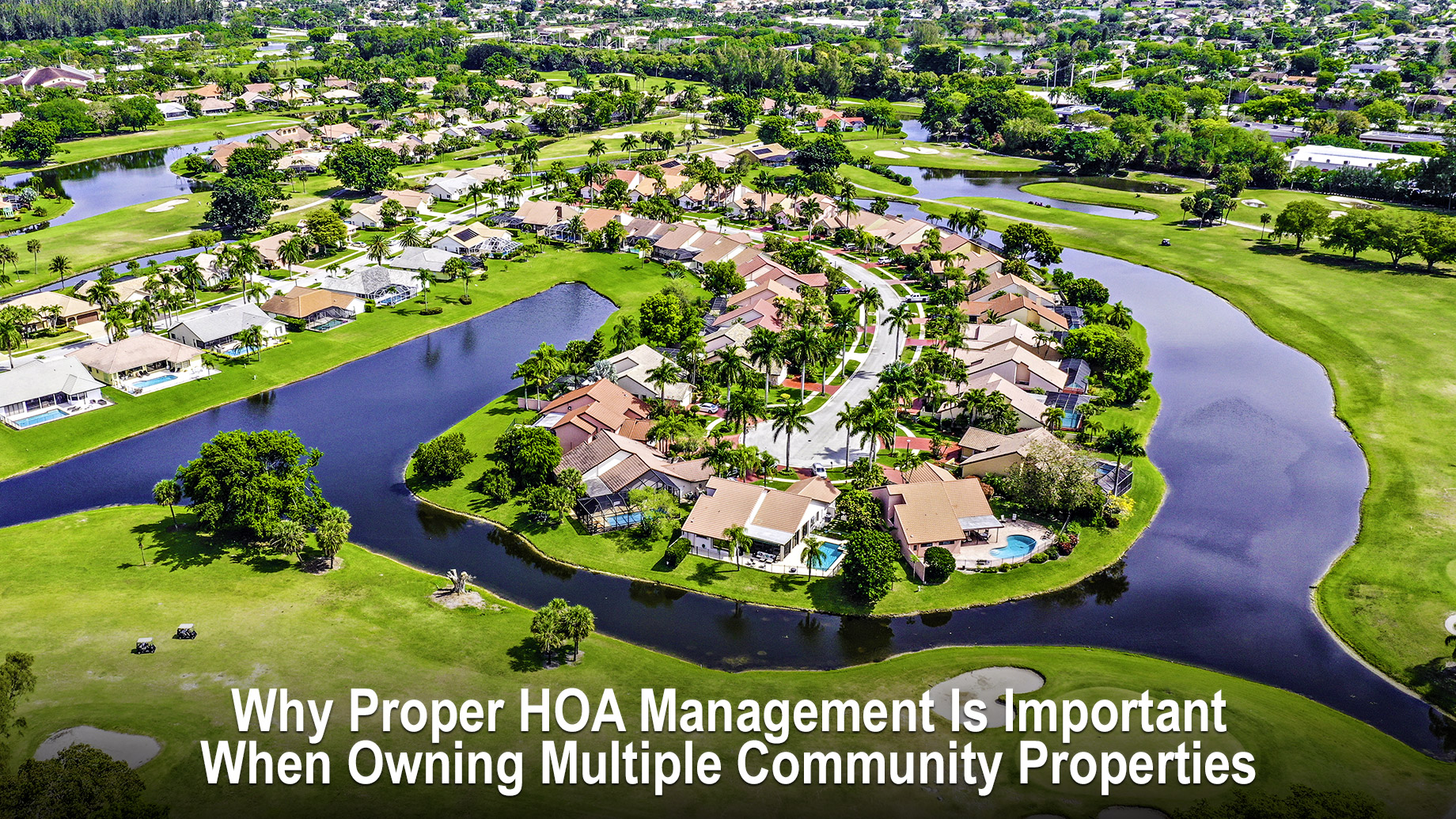The Critical Function of HOA Administration in Upholding Neighborhood Standards and Rules
Homeowners Associations (HOAs) serve a pivotal function in preserving neighborhood requirements and regulations, working as the guardian of common values and looks within areas. Their responsibilities expand past simple enforcement; they cultivate a feeling of belonging and accountability among locals. By diligently taking care of standards and resolving non-compliance, HOAs not only protect residential property values however likewise grow an atmosphere where communication and cooperation can thrive. However, the performance of these administration strategies elevates important concerns regarding governance, resident involvement, and the equilibrium in between guideline and personal liberty. What implications do these characteristics hold for the future of neighborhood living?
Value of HOA Administration
The significance of efficient HOA management can not be overemphasized, as it plays a vital duty in preserving the general high quality and allure of a neighborhood. House Owners' Organizations (HOAs) serve as the backbone of residential neighborhoods, providing framework and organization that cultivates a harmonious living environment. Via reliable monitoring, HOAs ensure that community criteria are upheld, therefore safeguarding residential property values and improving residents' top quality of life.
A well-managed HOA can promote open communication among residents, address grievances promptly, and produce a feeling of belonging. It establishes guidelines and guidelines that show the area's values, ensuring consistent upkeep of common rooms and features. Furthermore, efficient management aids in monetary preparation and resource allotment, which is important for the sustainability of area tasks and upkeep.
In addition, an efficient HOA can advertise community engagement by cultivating and organizing events cooperation amongst citizens - austin hoa management. This not only enhances partnerships yet likewise motivates energetic involvement in decision-making processes. Ultimately, reliable HOA administration is crucial for cultivating a dynamic, appealing, and cohesive community that meets the demands and expectations of its locals
Secret Duties of HOAs
Regularly, Home Owners' Organizations (HOAs) think a variety of key responsibilities that are vital for the smooth procedure and upkeep of a community. Among the key tasks of HOAs is to handle the monetary aspects of the community, consisting of budgeting, gathering fees, and keeping book funds for future repair work and enhancements. This economic oversight makes certain that the community continues to be well-kept and sustainable.
In Addition, HOAs are in charge of preserving usual areas, such as parks, pools, and landscape design. This involves regular upkeep, repair services, and improvements to guarantee these rooms remain eye-catching and practical for locals. Communication is also an important aspect of HOA duties; they should maintain house owners informed concerning neighborhood information, upcoming conferences, and modifications to policies or laws.

In addition, HOAs frequently assist in community occasions and activities, fostering a feeling of belonging and involvement amongst citizens. They may likewise handle management jobs, including record-keeping and compliance with state and regional laws. Via these obligations, HOAs play an important function in promoting a cohesive and well-managed area, inevitably improving property worths and citizens' lifestyle.

Enforcing Community Criteria
To maintain a harmonious living environment, HOAs play a vital duty in imposing neighborhood standards. These criteria, generally detailed in governing files such as the Affirmation of Conditions, covenants, and limitations (CC&R s), are created to preserve home worths, guarantee aesthetic consistency, and advertise a feeling of community among residents. HOAs must guarantee that all homeowners abide by these standards to produce a properly maintained area.
Enforcement mechanisms can vary, but commonly entail normal evaluations of buildings, interaction with locals concerning offenses, and the charge of penalties for non-compliance. Such steps may include penalties, ask for corrective activity, or, in extreme cases, legal procedures. A positive approach to enforcement not only discourages prospective offenses yet likewise cultivates a society of responsibility among locals.
HOAs should plainly communicate requirements, assumptions, and repercussions to all homeowners. Eventually, efficient enforcement of area criteria by HOAs is important for preserving the general quality of life within the neighborhood and maintaining the worths that homeowners have actually spent in their homes.
Problem Resolution Approaches
Effective conflict resolution techniques are vital for maintaining a relaxed and cooperative neighborhood within home owners' associations (HOAs) HOAs usually serve as the initial line of defense in resolving disagreements that develop among citizens. Applying positive communication practices is critical; this includes establishing clear networks for residents to voice problems and complaints. Regular meetings and area forums can help with open discussion, enabling members to reveal their point of views and seek good understanding.
Additionally, arbitration plays a significant role in settling conflicts (austin hoa management). Neutral third-party conciliators can aid facilitate conversations and guide parties toward a collective option. This method emphasizes concession and cultivates a sense of community, instead of permitting conflicts to intensify into contentious fights
Additionally, establishing and enforcing a clear set of policies and treatments for dealing with disputes is important. These standards should be communicated efficiently to all homeowners, making sure everybody comprehends the procedure for lodging problems and looking for resolution. Last but not least, offering dispute resolution training for board members and community leaders outfits them with the necessary skills to handle disputes efficiently, guaranteeing that problems are settled amicably and based on the community's regulations and requirements.
Enhancing Building Worths
Preserving unified connections among locals not only find fosters a sense of community yet also plays a substantial function in enhancing residential property values within home owners' organizations (HOAs) Reliable HOA monitoring ensures that community standards and guidelines are maintained, developing a setting where property upkeep is focused on. Well-maintained common locations, adherence to building guidelines, and punctual enforcement of regulations add to an appealing neighborhood that brings in prospective buyers.

Furthermore, normal upkeep and enhancement projects, such as landscape design and center upgrades, show favorably on building worths. HOAs that effectively take care of spending plans to money these campaigns demonstrate a dedication to long-term value conservation.
Ultimately, an HOA that prioritizes neighborhood connections and residential property standards produces a preferable living atmosphere. This not only advantages current Check Out Your URL citizens however likewise places the community favorably in the realty market, guaranteeing that property worths remain eye-catching and durable to future home owners.
Final Thought
To conclude, HOA monitoring is necessary for keeping area standards and guidelines, therefore fostering an unified living environment. With the enforcement of standards, normal residential property inspections, and efficient conflict resolution methods, HOAs play a crucial role in enhancing home worths and advertising openness among citizens. The positive procedures carried out by HOAs not just protect the aesthetic integrity of communities but also add to a cohesive ambience that sustains open communication and partnership among all residents.
Through effective monitoring, HOAs make certain that area criteria are maintained, consequently safeguarding home values that site and enhancing homeowners' top quality of life.
With these obligations, HOAs play an important role in advertising a natural and well-managed community, inevitably improving home values and homeowners' high quality of life.
Eventually, reliable enforcement of neighborhood standards by HOAs is vital for keeping the overall top quality of life within the neighborhood and upholding the values that residents have actually invested in their homes.
Giving dispute resolution training for board members and neighborhood leaders equips them with the essential skills to take care of conflicts effectively, making certain that conflicts are solved amicably and in accordance with the community's laws and criteria.
Keeping unified connections among locals not just cultivates a sense of neighborhood but likewise plays a substantial function in enhancing building values within house owners' organizations (HOAs)